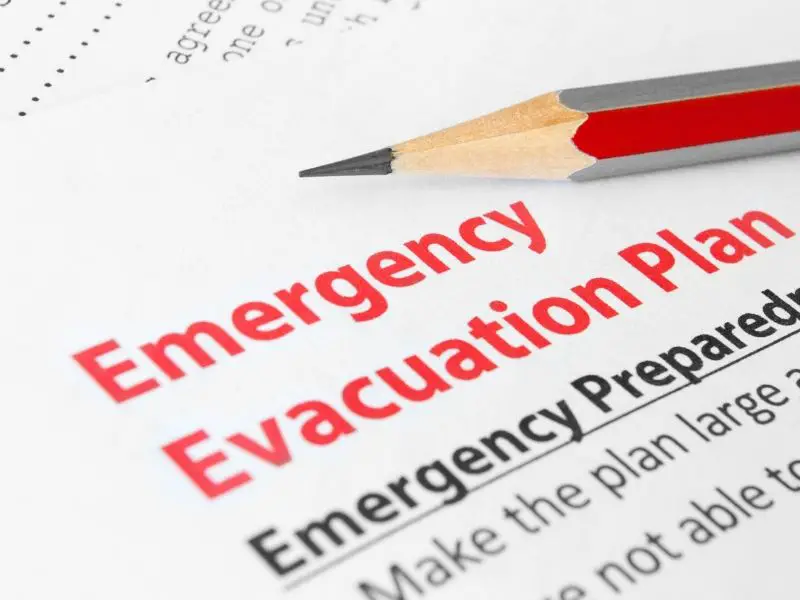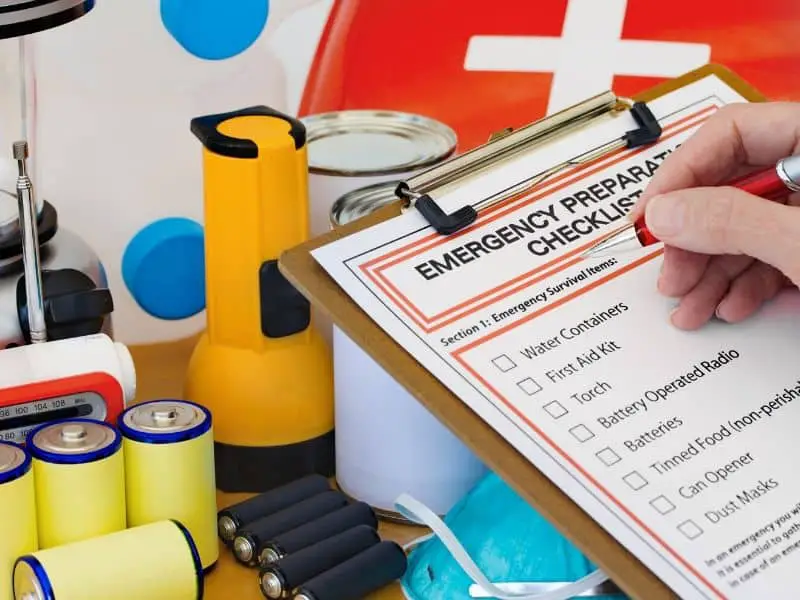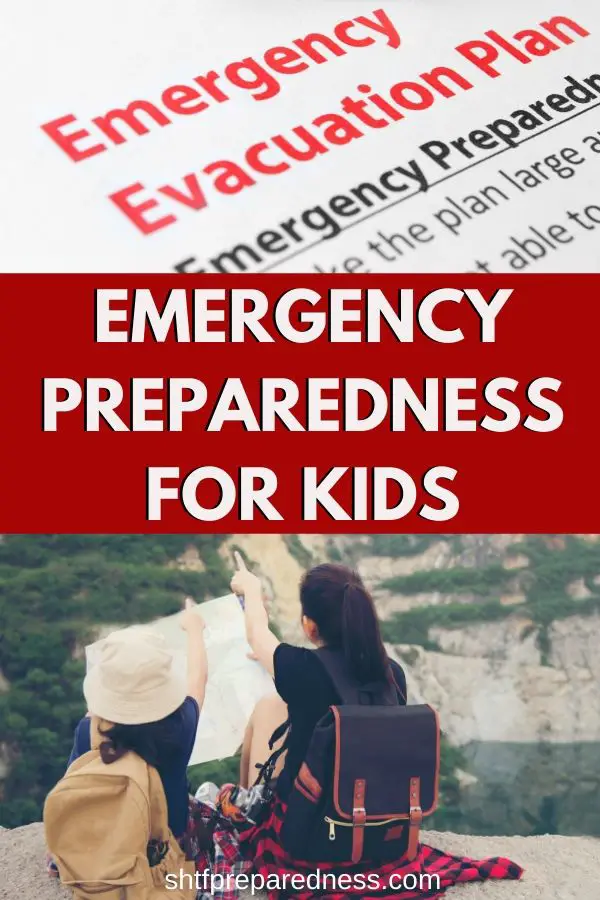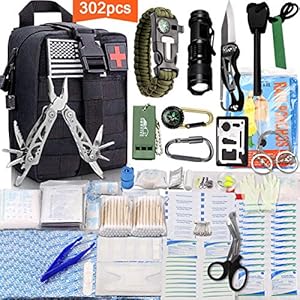SHTFPreparedness may collect a share of sales or other compensation from the links on this page.
No one is sure enough when and where a disaster or any sort of emergency will happen. It strikes quickly and at random, often without warning.
Dealing with a disaster can be a stressful and nerve-racking experience for anyone, but especially for kids. Looking into emergency preparedness for kids should be an important part of your plan.

Disasters are frightening, even for adults. So emergency preparedness must be discussed by parents with their kids on a regular basis.
Remember that your kids are not with you all the time. So, in order to ensure their safety and survival, you need to prepare and train them for the worst-case scenarios.
Preppers are always ahead. But how about preppers’ kids? Are they preppers too?
Emergency preparedness for kids is not just a girl scout or boy scout thing. Instead, it’s arming your kids with extra knowledge and mindset in times of apocalypse, which kids might imagine in movies.
How do you prepare your children for a season of emergencies? Below, you’ll find an emergency preparedness guide for kids with some quick survival and prepping tips to prepare them right away.
Emergency Preparedness For Kids Guide
Talk About Disasters in Advance
Disasters come in many forms and strengths. Sometimes, they pay a surprise visit. So, the best way to welcome them is to prepare, prepare and prepare; this discussion with your kids in advance is very important.
Discuss Your Emergency Plan

When you involve your kids in your emergency plans, you’re giving them a sense of empowerment.
You’re allowing them to be in charge. An autonomous child will hold the authority to your family’s safety too. Consider these tips:
- Make and sketch an Evacuation Plan (they’ll surely enjoy this)
- Condition their minds like what they have seen in the movie
- Let them memorize important phone numbers (neighbor, health centers, 911, etc.)
- Get a local map and a highlighter and determine important destinations and the routes to get there
Get a Survival Kit and Discuss Kit Rules

Any disaster plan is incomplete without supplies like food and water, medicine, tools, gear, etc.
Let your kids help you gather these supplies for your home or car survival kit. This will encourage them to pay attention and take your advice seriously.
Make sure your kids know where the items are to be found and that these items are specifically used during emergencies.
You may ask them what item or supply they want to add to your emergency preparedness kit. Allow your children to get it for themselves so they can become acquainted with these items.
Emergency Survival Kit  First Aid Survival Kit
First Aid Survival Kit
Practice / Role-Play
You can do this through a game with scenarios for your kids to test their knowledge. Perform scenarios according to their age and development.
Do this once or twice a year so that your kids are prepared to deal with emergencies as much as possible.
Role-playing emergency situations will reduce panic or anxiety in case of a real emergency occurs. Just make sure to process or discuss the game or scenario you played.
Approaches should differ depending on the age of the child. But even a 5-year-old may be able to understand the importance of having a place to meet up if something happens.
Giving kids a role in this situation, especially after they see disasters somewhere else, is an advantage to make them feel safer.
Survivor Kid: A Practical Guide to Wilderness Survival
Guide Your Kids During Disaster
The feeling of fear is natural but in times of emergencies, your kids are surely in a great mess. They will be looking for clues on what to do and will definitely look for you to rescue them.
Here are a few things to keep in mind during the disaster:
Keep Calm
This is the best weapon in any kind of catastrophe.
Kids will take clues from you. If you show any sign of distress, your kids may become more scared, noticing your fear as an indication that the danger is real.
If you demonstrate calmness and are in control, your child may feel more confident and better able to cope.
Stay Indoors
Listen to the news for updates and warnings. It is important to know what the officials and other person-in-charge instructions are, whether the disaster is under control and you just need to stay indoors or if you need to evacuate from your house for safety.
- Remove any electrical connected-wires as much as possible. This will help you lessen the possibility of catching radiation in your house or you can just turn off the main electrical switch.
- Evacuate when local authorities tell you to do so. When you need to evacuate, stay calm. Turn off the main electricity switch, close the windows, secure the safety of your house and bring your survival kit or go-bag.
Kid’s fears are increased by their imagination. NEVER take their feelings of fear for granted. Your words and actions give reassurance: just be sure to portray a realistic picture that is both honest and sincere.
During emergencies, things can always get out of control. But your kids will feel confident knowing that you’re doing your best for them.
Giving hugs and building security are necessary during these times. So when you sit with your kids, make sure they know that you will do everything you can to keep him, no matter what the odds are.
Help Your Kids Recover After a Disaster
Know What to Expect
Kids depend on familiar and encoded routines. Once an emergency interrupts their system, they may become confused, frightened, or unwilling to perform.
These may be expressed in a different manner, like withdrawal, aloofness, or shyness, and perhaps lead to aggressiveness and other extreme behaviors.
That is why it is imperative to talk and explain to your kids what has happened in your house, your surroundings, the people, or even the community you have lived in (in case worse scenarios happen).
This allows them to internalize and reflect on what they have felt during the splash of disasters until it’s over.
Know What to Do
Be keen on your kids’ emotional and psychological state by asking first what is in their minds. Your kids need to participate in your family’s recovery activities and soon they will feel that things are getting back to normal.
Prevent your kids from watching television programs or news reports about the event or any kind of disaster.
It can be upsetting for them and possibly recall a tragic or uncomfortable feeling, especially when kids are too young to control and hold on to their feelings.
You can relay the news much better, in a simplified way that is appropriate for their age.
Know How to Help Kids Cope
Kids may not be aware that they are emotionally disturbed by the catastrophic experience you had in your family. You need to gradually learn how to get rid of unfriendly symptoms. Here are a few keys to help them recover:
- Have a normal conversation and never bring up the topic first. Wait until your child opens up about it.
- Expose your children to outdoor wilderness survival activities and that will help their mind divert to a variety of things. You may consider camping, fishing, or just playing around your house like you normally do.
- Always give positive reinforcement or positive regard towards your everyday discourse.
Ultimately, one of the most important ways you can minimize your kids’ stress and anxiety in an emergency situation is through coping well yourself.



